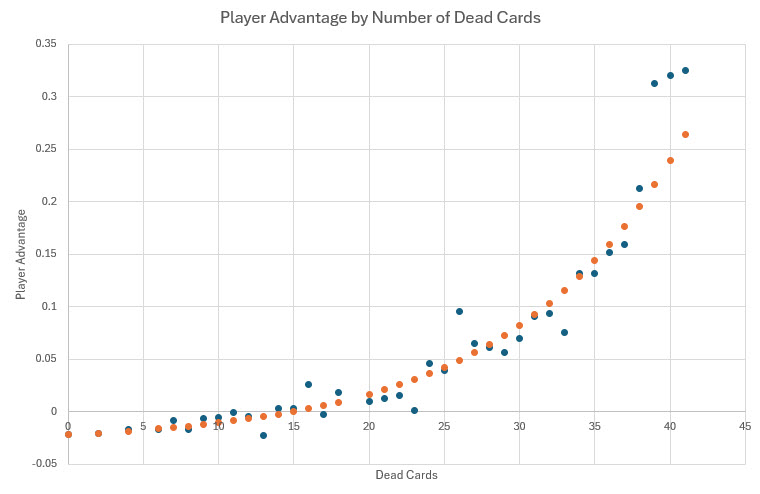On this page
Ultimate Texas Hold 'Em Collusion
Introduction
With the ever-increasing popularity of Electric Table Games (ETGs), it is easy to share information between players about the cards they hold. At a six-player table of Ultimate Texas Hold 'Em, every player could have knowledge of ten cards already out of play. A question I often get is how beneficial is to know and make perfect use of ten dead cards. This article endeavors to answer that question.
JB Analysis
To answer the question, my assistant JB, whom I have strong faith in, ran a simulation of 40,000 rounds of Ultimate Texas Hold 'Em. Each round consisted of two random hole cards and ten random dead cards. It is assumed the player followed computer-perfect strategy at every step.
The bottom line is such a player still lost 0.0064 units for every unit bet on the Ante. In other words, a 0.64% house edge. The element of risk, defined as the ratio of expected loss to all money bet, is 0.15%.
The house edge with no known dead cards is 2.19% with an element of risk of 0.53%. Thus, the reduction in the house edge is 71%.
Of the 40,000 hands, the player deviated from conventional strategy pre-flop 3,613 times, for a rate of 9.0%.
Mental Blok Analysis
When this topic came up in my forum at Wizard of Vegas, forum mental Mental, who prefers to be known as Mental Block, made some outstanding contributions. He wrote his own simulator, but examined the effect of 1 to 43 dead cards. The following chart summarizes his results.

The blue dots in the graph show the actual simulation results. The orange dots show points on an exponential regression line. The formula for the player advantage (based on the Ante bet), according to d dead cards is as follows:
Player advantage = 0.008034*e0.0878d -0.03
For 10 dead cards, his exact simulation results are a house edge of 0.58%. Using the regression formula, it is 1.07%. Either way, I consider it to be within the margin of error of JB's 0.64%.
Based on Mental Block's regression formula, the player does not begin to see an advantage until 16 dead cards.
Conclusion
The bottom line is that collusion in Ultimate Texas Hold 'Em is not worth the bother. A simple and reliable strategy could cut down the house edge marginally. I indicate a link about that below.
Acknowledgments
I would like to thank JB and Mental Blok for their outstanding contribution to this topic.
External Links
- Practical Collusion for Ultimate Texas Hold ’em — Article at Discount Gambling offers a collusion strategy for certain margin 4x raise hands pre-flop.
- Ultimate Texas Hold 'Em: Face Up Cards — Discussion about collusion in UTH in my forum at Wizard of Vegas.
- Ultimate Texas Hold 'Em Collusion — Article by Eliot Jacobson on this topic. Eliot concludes a six-player collusion player advantage of 2.5%, based on a 500-hand simulation. I simply disagree with this figure.



